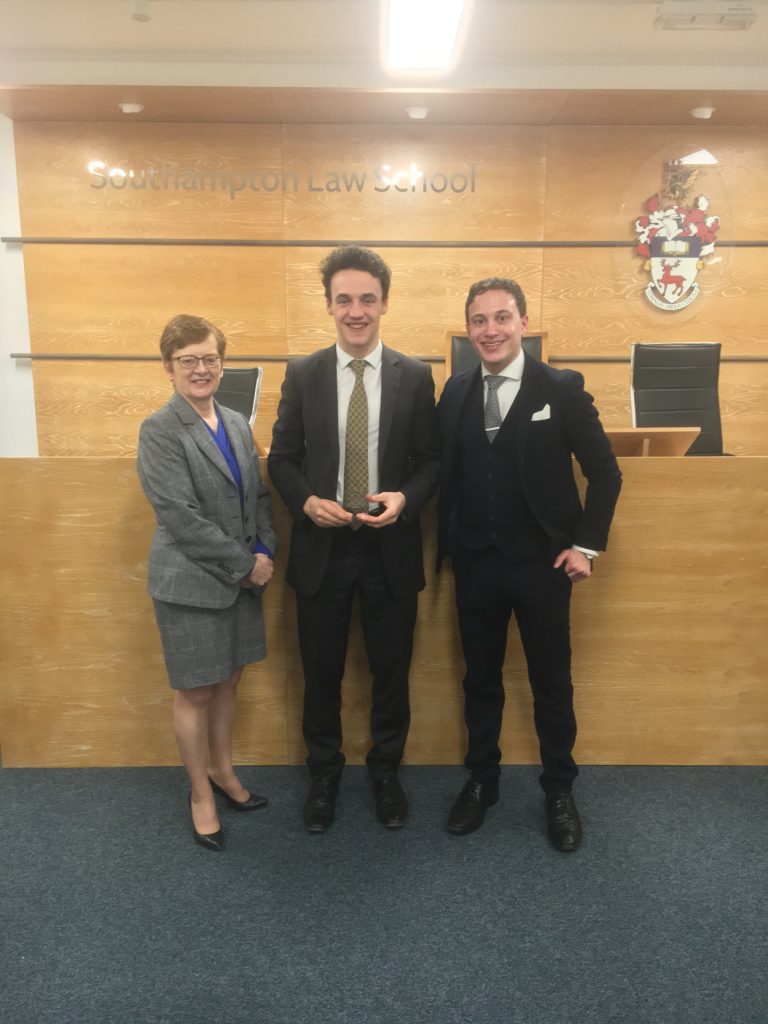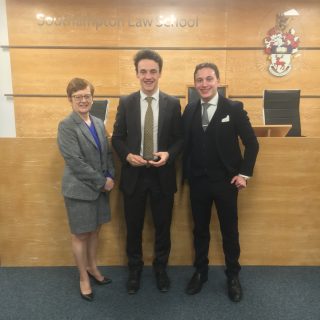
On 26 February, I travelled, along with my fellow GDL student Casper Ramsay, to the University of Southampton to take part in their Inns of Court Society Inter-Varsity Moot. On the train with us was a suitcase full of five lever arch files, containing between them nearly a thousand pages of bundle.
Although carrying all these documents was slightly inconvenient, it was also quite exciting: we felt like real barristers, off to a provincial county court for a hearing, documents in tow. Unlike real barristers, however, we had no idea which side of the case we would be arguing! The Southampton moot required competitors to prepare both appellant and respondent sides of their moot problem, which touched on liability in tort and in insurance law for asbestos-induced mesothelioma. This meant that Casper and I had spent weeks essentially arguing with ourselves, to ensure that whichever side we were assigned, we would have the strongest possible case. Equally, it meant we avoided overly practising our oral advocacy, since any speeches we gave in the actual moot would have to take account of our opponents’ bundle, which we would only see about ten minutes ahead of our opening rounds. As a consequence our preparation instead focused on mastering our authorities, so we could smoothly reference either the appellant or respondent bundle.

This preparation paid off in the moot itself. We were able to distinguish ourselves from our competitors by avoiding prescriptive notes and speeches, and reacting more naturally to judicial intervention, because we had sufficient command of our authorities to allow for a looser and more improvisational style. After two preliminary rounds (one as appellant, one as respondent), we progressed to the semi-final, against one of the teams from the University of Cambridge. The semi-finals were judged (like the real court of appeal) by three judges, including a real District Judge. Our semi-final opponents took the role of appellant, and presented some very novel and interesting arguments. This meant that Caspar and I had very little time to rapidly read their bundle and improvise 12 minutes (each) of response.
In part in response to feedback I’d received in the preliminary rounds, I decided to try to be as slow and methodical as possible in the semi-final, despite the fact that I had about a thousand points to respond to. I did my best to emulate my favourite advocacy style: the calm, confident, and scholarly attitude used by inter alia Lord Pannick QC. I also decided to go almost entirely without notes, relying only on some hastily scribbled page numbers. This was absolutely terrifying, but ultimately successful. After the semi-final, the District Judge went so far as to say that I was a “very, very good advocate” (which was incredibly nice to hear). In the end, we narrowly beat our opponents by half a point!

In the finals, we were (again) against a team from Cambridge. As with the semi-finals, our opponents were very skilled, but had entirely different advocacy styles and arguments. Caspar and I elected to be the respondents again, in part because of the advantage of being able to respond in real time to our opponents’ case. Once again, we elected to go almost entirely without notes, because we had already mooted the same case three times before. In the end, we lost by one point, taking the runner up’s spot.
The moot was an enormous amount of fun, and winning a trophy was, of course, delightful. It also was a reminder of just the invaluable opportunity afforded to law students. Throughout our four rounds of mooting that day, Caspar and I probably each received nearly an hour of individual advocacy feedback each from practising barristers and judges, entirely for free (thanks to City’s support). Given how much a barrister’s time is worth, we were extraordinarily privileged to be able to access this resource. I am certainly a better advocate thanks to the feedback offered by the moot’s judges, and was even (as said earlier) able to improve over the course of the moot itself. Participating in a moot is essentially being offered a free advocacy course taught by experienced professionals, and for that reason alone, a necessary experience for any law student.
QUICK TIPS
- I strongly recommend that mooters emphasise the ‘little things’, since even small touches can greatly impress judges. Caspar and I got very positive feedback because we were the only team that bothered with internally paginating our bundles, which meant that we made the judges’ task immensely easier (and judges always like helpful advocates).
- On the same vein, many competitors that day were tripped up trying to pronounce the leading case on asbestos liability, Sinkiewciz v Greif [2011] UKSC 10. A quick bit of googling on Polish pronunciation meant that, in the moot itself, I could easily roll the consonant-heavy name off my tongue. Law students can impress moot judges and tort tutors by knowing that the landmark precedent is pronounced roughly as: shen-kyey-vich.
- Don’t be scared of judicial interruption! In our second preliminary round, the judge disagreed intensely with my interpretation of the law, but I (extremely politely) stood my ground and argued my case strongly. In subsequent feedback, the judge said he was very impressed by my ability to hold my position, even if he still completely disagreed with it.
- Finally, it’s always worth paying brief attention to the question of remedy. In the preliminary rounds, we were able to distinguish ourselves by asking the courts for specific remedies provided by civil procedure. Many mooters omit this part, because it isn’t generally covered in academic programmes, but even cursory references to the Civil Procedure Rules and preferred outcomes can impress judges by looking professional.

Many thanks to Elijah Granet for this helpful insight into the City team’s day in Southampton. Elijah is a GDL student at City, University of London, originally from California. Before law, he most recently completed an MPhil in Politics & International Relations at Clare College, Cambridge. His main areas of legal interest include commercial, private international law, administrative, and European law. Outside the law, he also fences, occasionally appears on game shows, and thinks of third items in lists. Elijah blogs at ezgranet.com..

